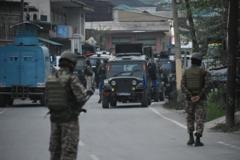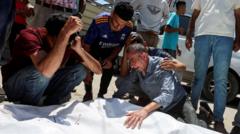In a major escalation of conflict between India and Pakistan, India has launched strikes classified as "Operation Sindoor" targeting locations in Pakistan and Pakistan-administered Kashmir after a high-profile militant attack that left 26 dead in Indian-administered Kashmir. The attacks, said to be aimed at "terrorist infrastructure," have been met with vehement denial from Pakistan, which claims the strikes are wholly unprovoked.
India Launches Strikes on Pakistan Following Deadly Militant Attack

India Launches Strikes on Pakistan Following Deadly Militant Attack
Indian defense forces conduct strikes in Pakistan and Pakistan-administered Kashmir in response to a recent militant assault.
The Indian Defense Ministry stated that the strikes were a measure of accountability following the April 22 attack that particularly targeted Hindu men and sparked outrage in India. Pakistan's Prime Minister, Shehbaz Sharif, condemned the Indian strikes as unprovoked aggression that would not go unpunished. Pakistan's military reported they had successfully shot down five Indian aircraft and a drone, while claiming the strikes resulted in civilian casualties.
The Indian government claims its military actions were focused and did not target Pakistani military installations. Instead, the strikes aimed to dismantle what India describes as terrorist camps where attacks are allegedly orchestrated. Pakistani authorities reject these claims, asserting that the Indian assaults hit civilian areas instead.
Tensions have escalated steadily in recent weeks, with both nations engaging in tit-for-tat diplomatic measures following the attack in the town of Pahalgam—a long-standing flashpoint in the Kashmir conflict. While India has pointed to Pakistan’s alleged support of militant groups, Islamabad continues to deny any involvement in the attack.
Kashmir has been a long-standing source of tension between India and Pakistan since the two countries' partition in 1947, leading to two major wars and ongoing insurgency. The recent surge in violence comes as the region commemorates its first major civilian attack since the revocation of its special status in 2019.
Global leaders and organizations, including UN Secretary-General Antonio Guterres and the US, have called for restraint, while the situation remains perilously close to further escalation. The world watches closely as both nations navigate this latest chapter in their tumultuous relationship.
The Indian government claims its military actions were focused and did not target Pakistani military installations. Instead, the strikes aimed to dismantle what India describes as terrorist camps where attacks are allegedly orchestrated. Pakistani authorities reject these claims, asserting that the Indian assaults hit civilian areas instead.
Tensions have escalated steadily in recent weeks, with both nations engaging in tit-for-tat diplomatic measures following the attack in the town of Pahalgam—a long-standing flashpoint in the Kashmir conflict. While India has pointed to Pakistan’s alleged support of militant groups, Islamabad continues to deny any involvement in the attack.
Kashmir has been a long-standing source of tension between India and Pakistan since the two countries' partition in 1947, leading to two major wars and ongoing insurgency. The recent surge in violence comes as the region commemorates its first major civilian attack since the revocation of its special status in 2019.
Global leaders and organizations, including UN Secretary-General Antonio Guterres and the US, have called for restraint, while the situation remains perilously close to further escalation. The world watches closely as both nations navigate this latest chapter in their tumultuous relationship.






















